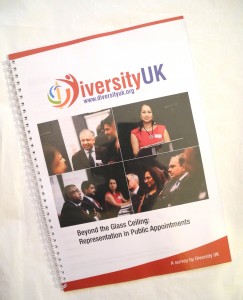Busting the ‘meritocracy’ myth about Public Appointments
 The 'Beyond the Glass Ceiling: Representation in Public Appointments' report by Diversity UK busts the myth that Public Appointments are made solely on the basis of merit. The survey, which for the first time collected the views of ethnic minority individuals, particularly women, found that the majority had not applied for a public appointment despite being aware of these appointments and despite 60% expressing a wish to apply in the future. Overly detailed application forms, requirements for sector-specific and previous board experience, poor feedback and a lack of cultural knowledge from executive recruitment consultants were all cited as reasons for detracting 68.3% of respondents from applying for an appointment. The survey was circulated to approximately 1500 senior director level individuals.
The 'Beyond the Glass Ceiling: Representation in Public Appointments' report by Diversity UK busts the myth that Public Appointments are made solely on the basis of merit. The survey, which for the first time collected the views of ethnic minority individuals, particularly women, found that the majority had not applied for a public appointment despite being aware of these appointments and despite 60% expressing a wish to apply in the future. Overly detailed application forms, requirements for sector-specific and previous board experience, poor feedback and a lack of cultural knowledge from executive recruitment consultants were all cited as reasons for detracting 68.3% of respondents from applying for an appointment. The survey was circulated to approximately 1500 senior director level individuals.
“For public bodies to claim that they are appointing solely on the basis of merit is a myth”, said Dilip Joshi MBE, Chair of Diversity UK, “the fact is that these bodies continue to fish in a very small pool appointing the same types of people over and over again”. An assertion supported by two independent reports published in June 2013; one from the Office of the Commissioner for Public Appointments (OCPA) and the other by Government Lead Non-Executive, Lord Browne of Madingley.
Gender Agenda driving ‘race’ off the agenda
The current preoccupation with improving the representation of women on boards, up to a voluntary target of 25% by 2015 as defined by the Lord Davies review of 2012 and the impending 40% female board member quota for large companies as favoured by the European Union (EU), has drawn attention away from the wider diversity agenda. However with increasing diversity in the population – 14% of the UK population is made up of ethnic minority individuals – Diversity UK felt it an appropriate time to highlight the alarming decline in progress.
“Despite the ‘quango cull’ of 2010 which has seen 1200 public bodies trimmed to 560 bodies in 2013 and the number of appointments shrink from 18,500 down to approximately 7,500, there were still 1087 appointments made last year. Statistically there should be 152 BME individuals to be representative of Britain’s population, whereas the reality is that there were only 56 BME individuals,” added Dilip Joshi, “this is less of a snowy peak syndrome and more like a whiteout!”
Bad appointments lead to bad decisions and poor governance
“This is not a case of simply banging the drum for ethnic minorities,” said Mr Joshi, “the past two years have shown the public that bad appointments lead to bad decisions and poor governance. For public bodies that often means a great waste of taxpayer’s money. Diverse representation at board level would help public bodies maintain contact with the public that they serve.”
Some of recommendations from the Diversity UK ‘Beyond the Glass Ceiling: Representation in Public Appointments’ survey are that:
* Public Bodies should set targets for the diversity representation on their board.
* Public Bodies should consider ethnic-only shortlists for one or two board level positions.
* Public Bodies should promote their activities and impact at a local level at community events in order to reach a more diverse segment of the public.
* Public Boards should reduce the number of re-appointments and re-applications from current board members.
* Public Bodies should embrace greater transparency in their operational activities by holding open public meetings.
* Public Bodies should reduce their use of executive recruitment consultants as the majority of head-hunters have no greater knowledge of the BME community than Public Bodies themselves.

Diversity UK also cites ONS & Labour Force statistics that show that ethnic-minority individuals attain better educational qualifications and demonstrate greater entrepreneurial activity than other groups in the population. “The corporate world is obsessed with recruiting and retaining the best talent – irrespective of gender, race, age or disability - for their organisations, surely it is about time Public Bodies embraced the same approach?”
The report was launched at a panel debate on Monday 25th November 2013 in London with The Rt Hon Baroness Verma Parliamentary Under-Secretary of State for Energy & Climate Change, Labour parliamentarian Seema Malhotra MP, Dipesh Shah OBE - former Chairman of Viridian plc and an experienced Non-Executive Director and Diversity UK Patron Oliver Rothschild.
Click here to download a copy of the 'Beyond the Glass Ceiling' report.
